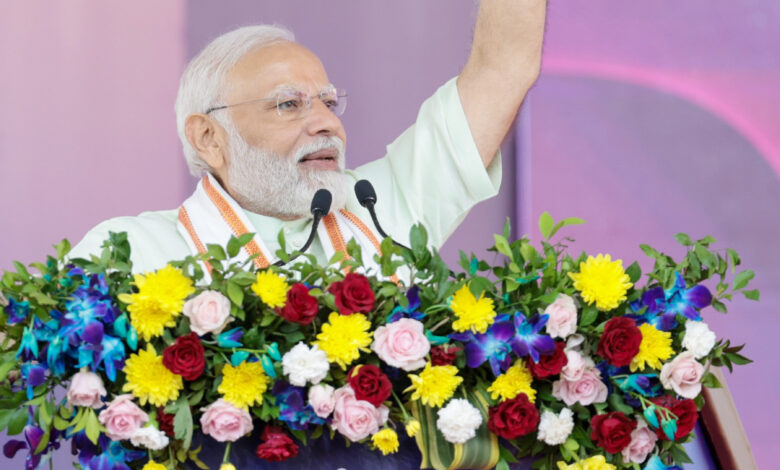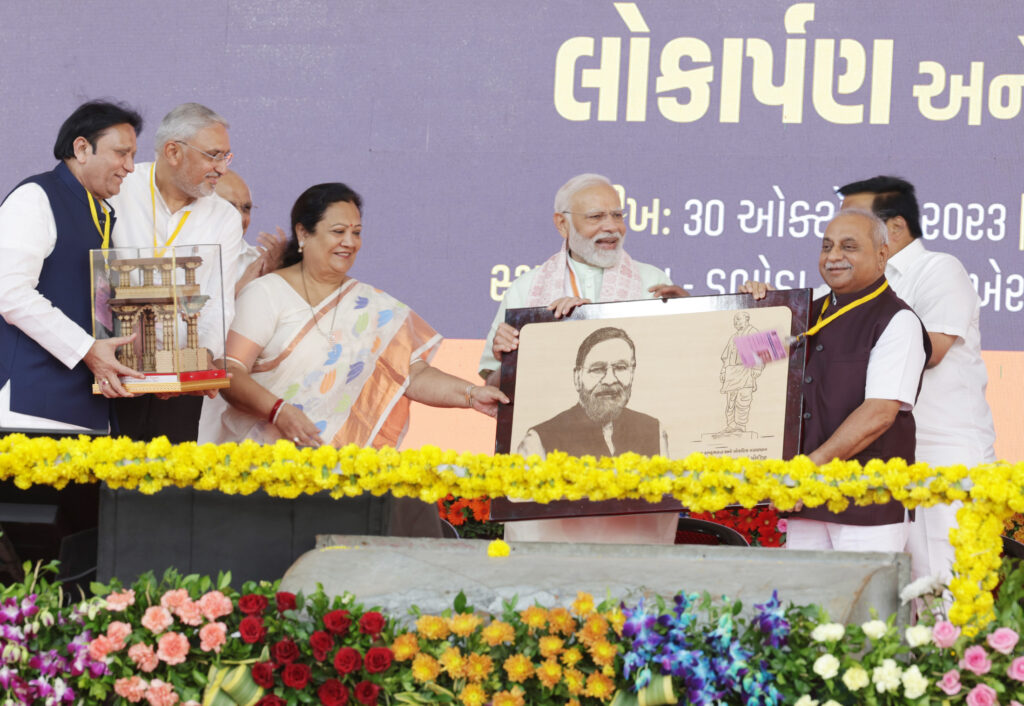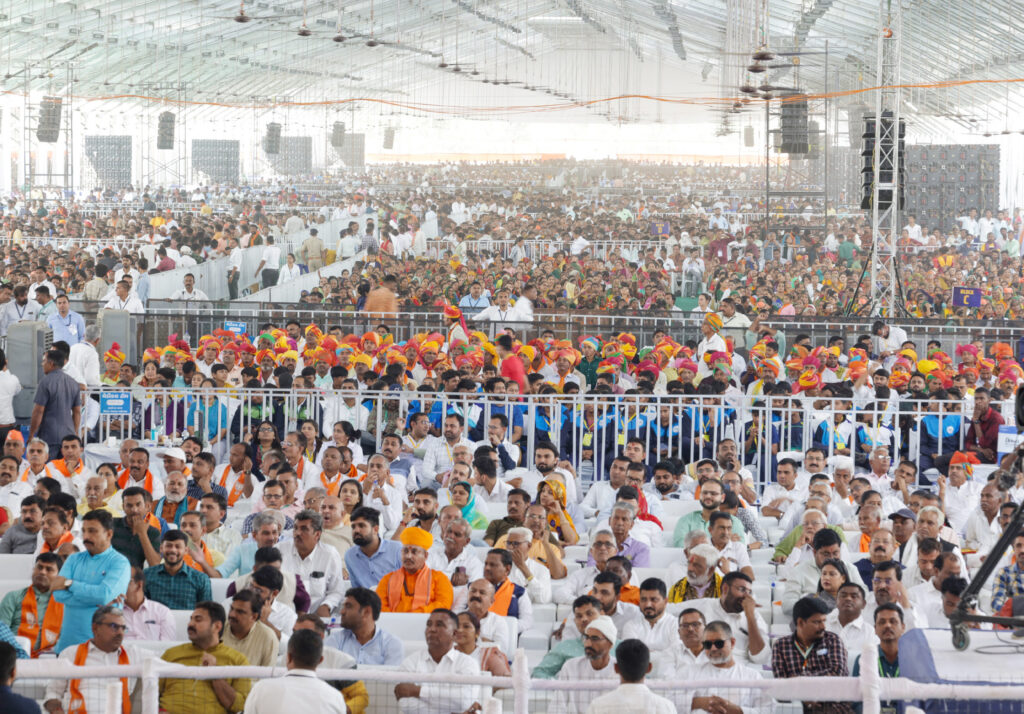Prime Minister Narendra Modi Unveils Ambitious Rs 5800 Crore Project Portfolio in Mehsana, Gujarat

In a momentous ceremony today, Prime Minister Narendra Modi inaugurated, dedicated to the nation, and laid the foundation stone for a diverse range of projects collectively valued at around Rs 5800 crores in Mehsana, Gujarat. These ambitious projects span various sectors, including railways, roads, drinking water, and irrigation, marking a significant leap in the region’s infrastructural and economic development.

Addressing the audience, Prime Minister Modi emphasized the historical significance of the dates, October 30th and 31st. He commemorated Govind Guru ji’s death anniversary on the former and celebrated Sardar Patel ji’s birth anniversary on the latter. Highlighting the Statue of Unity, a tribute to Sardar Patel, as a symbol of reverence and national pride, he underlined the invaluable contribution of Govind Guru ji to India’s independence and expressed gratitude for recognizing Mangarh Dham’s national importance.
The Prime Minister also spoke of his visit to the Ambaji Temple earlier in the day and the ongoing efforts to enhance Gabbar Parvat’s magnificence. Regarding the day’s projects, he mentioned the foundation stones of projects worth nearly Rs 6000 crores, expressing his hope that these developments would boost connectivity and bring substantial benefits to the farmers in the region. He noted that districts in the vicinity, including Mehsana, Patan, Banaskantha, Sabarkantha, Mahisagar, Ahmedabad, and Gandhinagar, would experience positive ripple effects from these projects.

Prime Minister Modi further stated that India’s development story had garnered international attention. He cited India’s achievements, such as Chandrayaan’s South Pole landing and a successful G20 presidency, as evidence of the nation’s growing global prominence. He praised the collective resolve of the Indian people, underscoring all-around development, from water conservation and irrigation to transportation infrastructure.
Modi’s commitment to fulfilling resolutions resonated in his speech, citing Gujarat’s stable government and the state’s significant development during his tenure. He highlighted the transformation of North Gujarat, from a region plagued by water scarcity and limited crop cultivation to one that now thrives on modern infrastructure, including a network of barrages for maximum water utilization. The Prime Minister noted the manifold increase in irrigation opportunities over two decades, particularly emphasizing the adoption of micro-irrigation technology by North Gujarat’s farmers.
Expanding on the agricultural sector’s success, Prime Minister Modi detailed the region’s crop diversity, including wheat, castor, groundnut, gram, fennel, cumin, and various spices. He also mentioned the unique identity of Gujarat in processing 90% of the country’s Isabgol. Efforts to develop Deesa as an organic farming hub for potatoes and plans for processing plants were part of his agricultural vision.
The Prime Minister addressed the water crisis, emphasizing the water conservation scheme that began in Gujarat and has since evolved into the national Jal Jeevan Mission. He commended the transformative Har Ghar Jal Abhiyan and its positive impact on millions of lives.
Prime Minister Modi acknowledged the significant role of women in animal husbandry and dairy development, citing the construction of hundreds of new veterinary hospitals and more than 800 new village dairy cooperative societies in North Gujarat. The Central Government’s substantial investment in livestock vaccination further underscores its commitment to this sector.
Additionally, Modi discussed the burgeoning automobile industry in North Gujarat, particularly the Mandal-Becharji Automobile Hub, which has boosted employment and income. He cited the doubling of income from industries in a decade, focusing on food processing, pharmaceuticals, and engineering industries in Mehsana. Ceramic-related industries in Banaskantha and Sabarkantha districts also received a mention.
The Prime Minister turned his attention to railway projects worth over Rs 5000 crores, emphasizing the critical Western Dedicated Freight Corridor (WDFC) section and its impact on North Gujarat’s connectivity with major ports, such as Pipavav, Porbandar, and Jamnagar. He highlighted the role of dedicated freight corridors in enhancing logistics and storage-related sectors in the region.
In the realm of renewable energy, Modi highlighted Gujarat’s solar parks and its efforts to provide financial assistance for rooftop solar installations, with the goal of reducing electricity bills for families. He noted the completion of approximately 2,500 km of Eastern and Western Dedicated Freight Corridors, reducing travel times and improving transportation. The transportation of milk via trains and the strengthening of railway lines in the region further enhances connectivity.
The Prime Minister recognized the tourism potential of Gujarat, mentioning the Kutch Rann Utsav, Dhordo village’s recent recognition as the world’s best tourist village, and the growing appeal of North Gujarat as a tourist destination. He highlighted Modhera Sun Temple, Kirti Toran of Vadnagar, and Vadnagar’s archaeological discoveries, noting the Central Government’s efforts to develop these sites under the Heritage Circuit.
In conclusion, Prime Minister Modi highlighted the unprecedented effort to link India’s heritage with development. He expressed his commitment to building a developed India, supported by various infrastructure and economic projects.
Chief Minister of Gujarat, Shri Bhupendra Patel, Member of Parliament, Shri C R Patil, and Union Minister of State, Smt Darshana Jardosh, were present at the ceremony.
Background:
The projects inaugurated by the Prime Minister include the New Bhandu-New Sanand(N) section of the Western Dedicated Freight Corridor (WDFC), doubling of the Viramgam – Samakhiali rail line, Katosan Road-Bechraji – Maruti Suzuki India Limited (MSIL Siding) Rail Project, project for recharge of various village lakes in Vijapur taluka and Mansa taluka of Mehsana and Gandhinagar district, Valasana barrage on Sabarmati river in Mehsana District, two schemes for provisioning of drinking water in Palanpur, Banaskantha, and the Dharoi dam based Palanpur lifeline project – Head work (HW) and water treatment plant of 80 MLD capacity.
Additionally, the Prime Minister laid the foundation stones for various development projects in Kheralu, a project providing irrigation facilities in Santrampur taluka of Mahisagar District, widening and strengthening of Naroda – Dehgam – Harsol – Dhansura Road, Sabarkantha, and projects for sewage treatment plants in Siddhpur (Patan), Palanpur (Banaskantha), Bayad (Aravalli), and Vadnagar (Mehsana).




